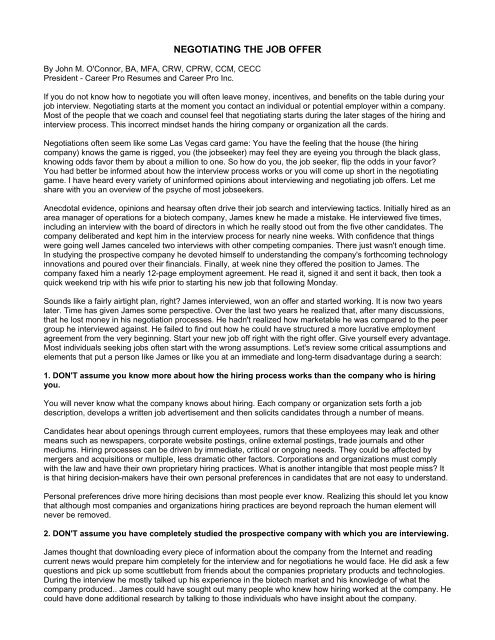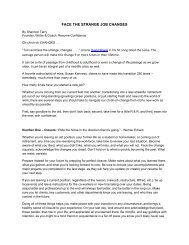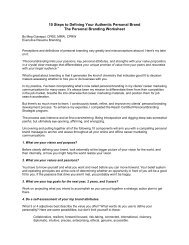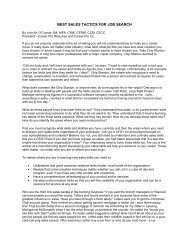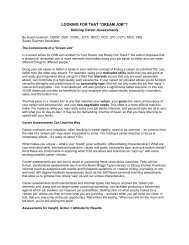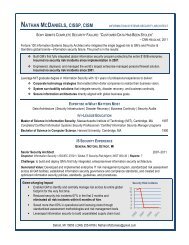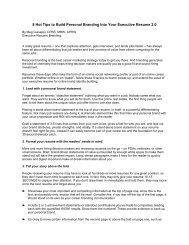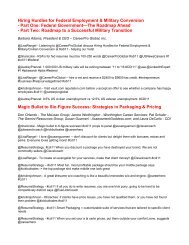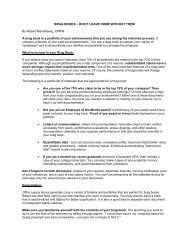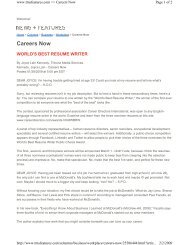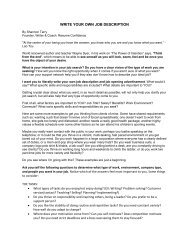NEGOTIATING THE JOB OFFER - Career Directors International
NEGOTIATING THE JOB OFFER - Career Directors International
NEGOTIATING THE JOB OFFER - Career Directors International
You also want an ePaper? Increase the reach of your titles
YUMPU automatically turns print PDFs into web optimized ePapers that Google loves.
<strong>NEGOTIATING</strong> <strong>THE</strong> <strong>JOB</strong> <strong>OFFER</strong><br />
By John M. O'Connor, BA, MFA, CRW, CPRW, CCM, CECC<br />
President - <strong>Career</strong> Pro Resumes and <strong>Career</strong> Pro Inc.<br />
If you do not know how to negotiate you will often leave money, incentives, and benefits on the table during your<br />
job interview. Negotiating starts at the moment you contact an individual or potential employer within a company.<br />
Most of the people that we coach and counsel feel that negotiating starts during the later stages of the hiring and<br />
interview process. This incorrect mindset hands the hiring company or organization all the cards.<br />
Negotiations often seem like some Las Vegas card game: You have the feeling that the house (the hiring<br />
company) knows the game is rigged, you (the jobseeker) may feel they are eyeing you through the black glass,<br />
knowing odds favor them by about a million to one. So how do you, the job seeker, flip the odds in your favor?<br />
You had better be informed about how the interview process works or you will come up short in the negotiating<br />
game. I have heard every variety of uninformed opinions about interviewing and negotiating job offers. Let me<br />
share with you an overview of the psyche of most jobseekers.<br />
Anecdotal evidence, opinions and hearsay often drive their job search and interviewing tactics. Initially hired as an<br />
area manager of operations for a biotech company, James knew he made a mistake. He interviewed five times,<br />
including an interview with the board of directors in which he really stood out from the five other candidates. The<br />
company deliberated and kept him in the interview process for nearly nine weeks. With confidence that things<br />
were going well James canceled two interviews with other competing companies. There just wasn't enough time.<br />
In studying the prospective company he devoted himself to understanding the company's forthcoming technology<br />
innovations and poured over their financials. Finally, at week nine they offered the position to James. The<br />
company faxed him a nearly 12-page employment agreement. He read it, signed it and sent it back, then took a<br />
quick weekend trip with his wife prior to starting his new job that following Monday.<br />
Sounds like a fairly airtight plan, right? James interviewed, won an offer and started working. It is now two years<br />
later. Time has given James some perspective. Over the last two years he realized that, after many discussions,<br />
that he lost money in his negotiation processes. He hadn't realized how marketable he was compared to the peer<br />
group he interviewed against. He failed to find out how he could have structured a more lucrative employment<br />
agreement from the very beginning. Start your new job off right with the right offer. Give yourself every advantage.<br />
Most individuals seeking jobs often start with the wrong assumptions. Let's review some critical assumptions and<br />
elements that put a person like James or like you at an immediate and long-term disadvantage during a search:<br />
1. DON'T assume you know more about how the hiring process works than the company who is hiring<br />
you.<br />
You will never know what the company knows about hiring. Each company or organization sets forth a job<br />
description, develops a written job advertisement and then solicits candidates through a number of means.<br />
Candidates hear about openings through current employees, rumors that these employees may leak and other<br />
means such as newspapers, corporate website postings, online external postings, trade journals and other<br />
mediums. Hiring processes can be driven by immediate, critical or ongoing needs. They could be affected by<br />
mergers and acquisitions or multiple, less dramatic other factors. Corporations and organizations must comply<br />
with the law and have their own proprietary hiring practices. What is another intangible that most people miss? It<br />
is that hiring decision-makers have their own personal preferences in candidates that are not easy to understand.<br />
Personal preferences drive more hiring decisions than most people ever know. Realizing this should let you know<br />
that although most companies and organizations hiring practices are beyond reproach the human element will<br />
never be removed.<br />
2. DON'T assume you have completely studied the prospective company with which you are interviewing.<br />
James thought that downloading every piece of information about the company from the Internet and reading<br />
current news would prepare him completely for the interview and for negotiations he would face. He did ask a few<br />
questions and pick up some scuttlebutt from friends about the companies proprietary products and technologies.<br />
During the interview he mostly talked up his experience in the biotech market and his knowledge of what the<br />
company produced.. James could have sought out many people who knew how hiring worked at the company. He<br />
could have done additional research by talking to those individuals who have insight about the company.
According to James: "I could have put myself at an advantage in the negotiation process if would have sought out<br />
some academics that I have known over the years who know the inter-workings of this company. James didn't<br />
realize that he could have designed an employment agreement that the company would have signed off on. "So<br />
this means that I lost a good bit over the last two years by not setting the sails right at the beginning," says James.<br />
"I know if I would have completely studied the company and knew my marketability from their perspective I could<br />
have negotiated for more money. It sounds greedy but it's really not." That's the point: jobseekers let emotions<br />
dictate too many of the decisions in their search. If James would have found out how creative he could have been<br />
with the initial offer he could have structured a much more favorable employment agreement. As James says<br />
now: "I just saw this big whopper of an agreement come back, felt like this was a good offer and did not want to<br />
rock the boat."<br />
3. DON'T assume you should wait until the end of the interview process to bring up salary and<br />
compensation issues.<br />
Because many people like James and others do not know their value to a company and don't spend a lot of time<br />
thinking through negotiation issues, they miss out on salary and compensation issue protocol. Know the salary<br />
range of the position. Talk to insiders if you can. Know what questions are appropriate for human resources<br />
personnel to answer. Know what questions and points you can make with the actual hiring manager. Know how to<br />
properly ask your network within the company so that you don't compromise their confidentiality. You may not<br />
have an advantage of knowing someone inside a prospective company but that's okay too. Know that salary and<br />
compensation issues that are tabled up front often delight an employer and recruiter. How you bring these issues<br />
up, your etiquette and listening skills will benefit you greatly to determine your market value and how you can<br />
negotiate in the right salary and compensation elements.<br />
4. DON'T assume the company has an ironclad job description that you either fit or don't fit.<br />
It would surprise most people to find out that almost all elements of the job description may change during the<br />
interview process. At least part of any job advertisement at the senior level must be redesigned or fit to the<br />
individual. Companies don't always exactly know what candidates they'll receive during a search process. There<br />
may be minimum standards but for the right person job descriptions will change to fit the growing needs of the<br />
organization. Knowing this presents a dilemma and an opportunity. The dilemma remains that you may not know<br />
all the elements that are going into hiring. However, the opportunity is for you to ensure that your potential value<br />
to the company is truly valued as early as possible. Innovative companies will be ready to deploy these abilities to<br />
drive revenue and reduce costs. This makes you more valuable and attractive. You may then convince a<br />
prospective employer that these new insights may require or justify a more prosperous offer.<br />
5. DON'T assume that large, typewritten employment agreements with a lot of legal language are not<br />
changeable.<br />
If you were a company wouldn't you create documents that seem impenetrable to most people who are hired? "I<br />
was so exhausted by the interview process," James says. "I just didn't have the energy to counter-offer. Plus the<br />
employment agreement looked unchangeable. It was as it turns out. Many companies expect counter-offers.<br />
Counter-offers don't have to be written in legalize. Counter-offers should be informed, serious documents. A<br />
proper counter-offer is expected by many organizations. Do most people send them? The answer is no. Like<br />
James, most jobseekers think that countering offers may hurt their hiring or make them appear too greedy, too<br />
thankless. Let me state this fact - if you were a company you would probably want people to feel the same way.<br />
Most companies don't encourage or coach you to negotiate your perfect offer. Most casinos don't offer courses on<br />
how to beat or what the odds really are either. You'll find out how good the odds are by checking your pocketbook<br />
at the end of the night. The house wins.<br />
So you say the news is not so bad for James. He's hired, doing well and employed. He would agree. But he did<br />
not find out what his competitive market value was to the company or in the marketplace. He was so exhausted<br />
by the search and interview process he never maximized his potential to design his right offer. It really benefits a<br />
company or organization too. It allows them to design proper offers, deploy talent and skills effectively and retain<br />
the best people.<br />
John M. O'Connor is the President of both divisions of <strong>Career</strong> Pro Inc. (Outplacement Excellence) and <strong>Career</strong> Pro<br />
Resumes. He is available for questions and consultations via phone at (919) 787-2400 or by email at<br />
john@careerproinc.com.
In 2004, Mr. O'Connor became the first private practice Certified Federal Job Search Trainer (CFJST) in North<br />
Carolina. He is also a Certified Electronic <strong>Career</strong> Coach (CECC). With a unique fiction writing pedigree with fiction<br />
publications as well, he obtained a Master of Fine Arts in Creative Writing from Bowling Green State University.<br />
With over 14 years experience in professional career transition, resume writing and career coaching, O’Connor<br />
applies his considerable job market expertise to career transitioners nationally.<br />
He has been featured recently (May 2003 and May 2004 feature) in the Raleigh News & Observer, Resume<br />
Writers Digest, The Gladiator, Execunet, <strong>Career</strong> Masters Institute Monthly Newsletter, Monster <strong>Career</strong> News and<br />
other national publications such as JIST. Additionally his diversified experience includes serving as a college<br />
professor.


